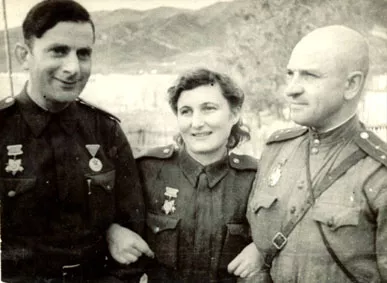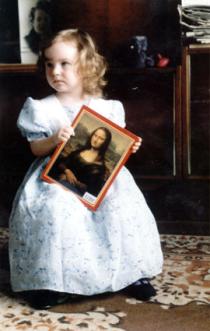Semyon Levbarg with his comrades: Zoya Polonskaya and Alexandr Polonskiy
I am having a break during the liberation of the Crimea in Gelendzhik [Russia, near Krasnodar] in February 1944. Beside me are my fellow comrades: Zoya and Alexandr Polonski from Moscow. I am wearing my awards: medal 'For Work Achievements' and 'First Grade Order' of the Patriotic War.
I was at a training near Moscow when the war began. In 1940 I and some other young builders were sent to have advanced training at a big plant in a small town near Moscow. I don't remember its name. It was a 6-month course and upon its completion I was to become an engineer. On 20th June 1941 we received our certificates and on 22nd June the Great Patriotic War began. I went to the military registry office. However, in those first days only those born in 1915 were recruited. I began to work as a mechanic at same plant where I had training and lived in the hostel of the plant. In May 1942 I was recruited to the army in the rank of lieutenant. I got to the front in November 1942. I was assigned to 143 Separate Red Banner Constanta Marine Battalion of the Black Sea Navy. I was a platoon leader there. We were at the very frontline. Our life was always at risk. Usually only about 10% of all marines survived in each combat action. [Editor’s note: sounds unusually high] During my first days there I took part in defense of Taman [a town on the Black and Azov Sea on the side of the Caucasus Mountains]. I remember vividly some episodes of the war.
On 24th September 1943 I took part in the landing on Peschanaya spot near Taman. My platoon was one of the first to jump into water from a boat and get to the shore. We attacked the enemy and occupied a beach-head [on the side of the Crimea]. The battle on the spot lasted 9 days non-stop. We were to break through the so-called 'Blue line' defense line of the enemy. I lead my platoon in attacks one hundred times and repulsed enemy's attacks. Then we started operations to prepare to attack Kerch [a town in the Crimea, spreading 80 km along the eastern shore of the peninsula]. Right before this operation I joined the Communist Party. There was no ceremony. All applicant officers received Party membership cards before the battle. I was appointed a commanding officer of a group of marines that included machine gunners, rifle men and mortar men. Our unit landed on the right wing of Kerch on 9th January 1944. In a few days attacks of the town began. I lead my soldiers and killed about 40 enemy-soldiers in that battle. I was awarded a 'First Grade Order' of the Patriotic War for Kerch. We stayed some time in the rear until our battalion was sent to attack ports on the Black Sea. At the end of August 1944 I took part in marine landings to the Romanian port of Constanta. I was assistant Chief of Headquarters of the battalion. I was also in a special unit that captured and disarmed the Romanian Navy. For these operations I was awarded the orders of Red Star and Red Banner. I was moving to the West - in the direction of Berlin - with my battalion on vehicles and tanks. In spring 1945 I took part in combat action in Vienna, Austria. The war was over when I was there. This was a lovely sunny day of 9th May 1945 - Victory Day. We were all happy, hugged and kissed each other. This was a holiday with tears in our eyes. We recalled our comrades that hadn't lived to see this day and our relatives and friends that perished in this war.












